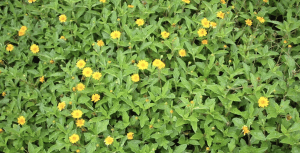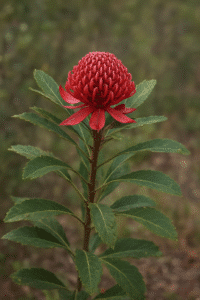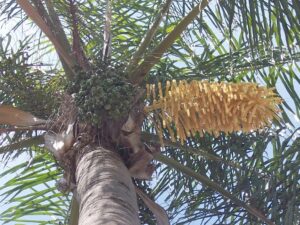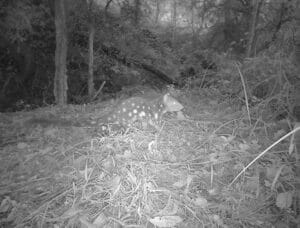 An ornamental ground cover that has jumped the fence, this plant is a seriously difficult weed to control if left unchecked. Native to Central America, the Caribbean and South America (and nothing to do with Singapore at all), this plant is currently in full bloom with bright yellow daisy-like flowers. It is a vigorous perennial herb that forms dense, mat-like layers of thick vegetation, and tends to root at each leaf node along the stem. This means it will spread vegetatively in bushland if dumped as green waste. The prolific flowering display is most common from Spring to Autumn, but it can flower all year round. Most commonly spread by vegetative fragments, Singapore daisy will move through the environment by water, animals, humans and on machinery and cars.
An ornamental ground cover that has jumped the fence, this plant is a seriously difficult weed to control if left unchecked. Native to Central America, the Caribbean and South America (and nothing to do with Singapore at all), this plant is currently in full bloom with bright yellow daisy-like flowers. It is a vigorous perennial herb that forms dense, mat-like layers of thick vegetation, and tends to root at each leaf node along the stem. This means it will spread vegetatively in bushland if dumped as green waste. The prolific flowering display is most common from Spring to Autumn, but it can flower all year round. Most commonly spread by vegetative fragments, Singapore daisy will move through the environment by water, animals, humans and on machinery and cars.
How to control it
Particularly problematic along the coastline in northern NSW, this species is one to eradicate if found on your restoration site. The dense layering habit will smother native ground covers, ferns, grasses and seedlings – out-competing them in the ground layer. The best method of control, although time-consuming, is to dig all parts of the plant out of the ground, and remove from the site in sealed bags for deep burial in landfill. As it is shallow-rooted, you may even be able to use a steel rake to remove the bulk of the infestation in the first instance, and then complete routine monthly checks for any regrowth, which can be plucked out and bagged for disposal. The job should become easier with each visit, but you will need to persist with the monthly visits for some time or else it will be back with a vengeance in no time.
Chemical treatment has varying success and will require multiple treatments over many months/years using the Off-Label Permit PER9907, preferably by a certified and experienced operator. Off-target damage to surrounding native vegetation is common during such treatments.
The plant can become a serious pasture weed and will affect feed for stock and horses.
Image credit: capeyorknrm.com.au




